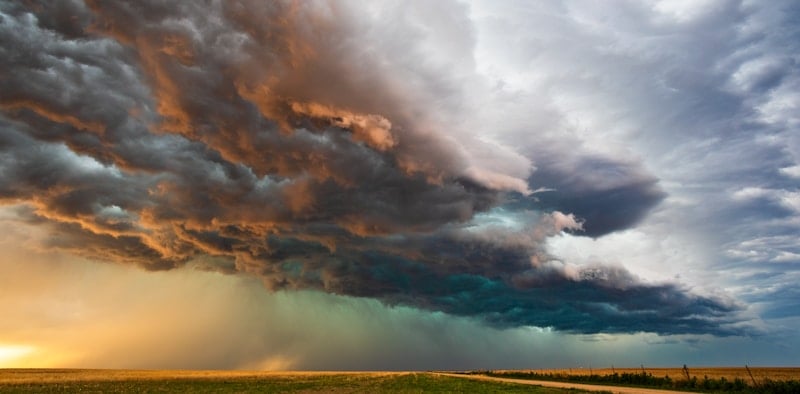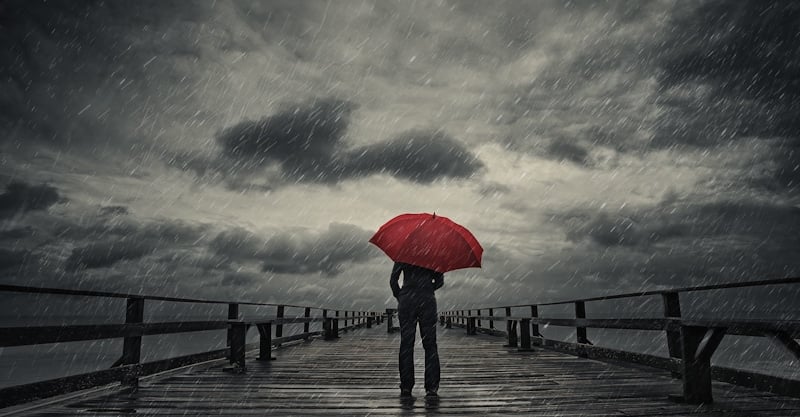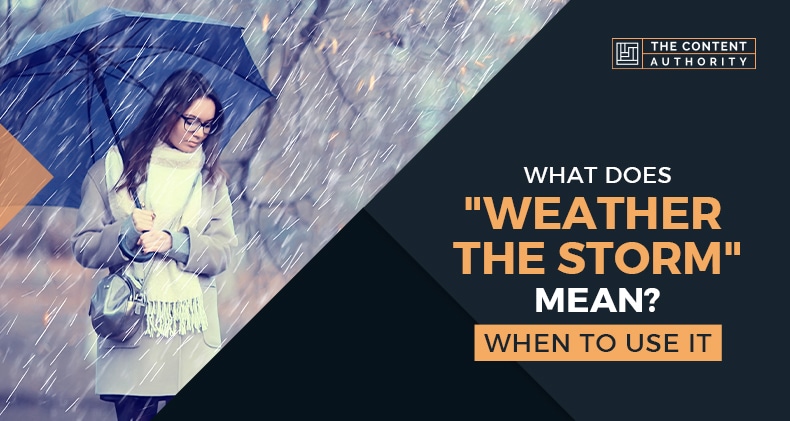There are a lot of idioms that have to do with the weather. Many of them are commonly used in the English language today without ever being given much thought.
To “weather the storm” is a saying that dates back to the mid-1600s. It alludes to a ship that’s traveled safely through bad weather. As such this saying has come to mean that someone has been able to deal with a difficult situation without being harmed or damaged by it too much.
Meaning of the Idiom
When you think of the idiom “weather the storm” you may think of a ship that’s made it safely through bad weather. While this is the literal meaning of this phrase, it’s important to realize that there are two ways in which you can understand English phrases such as this one. This phrase also has a metaphorical (a.k.a. figurative) meaning which means that the word (e.g. storm) and the action that’s applied to it (e.g. weather) aren’t literally applicable. The metaphorical meaning of “weather the storm” is to say that you’re dealing with a difficult situation without being severely harmed or damaged or that you’ve been able to continue doing something even though you’ve faced some serious issues with it.

Understanding the Idiom
While “weather the storm” can also be used to mean that you need to “find shelter and a way to ride out the impending storm,” it’s rarely used in this way. Nevertheless, it’s important to take a closer look at this idiom’s dual meaning to really understand what it means and how to use it.
To begin with we have the word “weather” which is the climate (e.g. wind, ice) or a climatic event (e.g. rain, snow, windy). Next, we have the word “storm” which could be anything from rain to snow, maybe even a hurricane. Together, when you “weather a storm” in a literal sense you’re hunkering down in your location to wait for this bad weather to pass you by. Now if you want to take this figuratively (which is how this phrase is most commonly used) you’re waiting for a period of hardship to pass you by.
We’re able to use this phrase in a figurative sense because sometimes the events in our lives become like a storm. When this happens we find that we need to hang on and wait for it to pass because surely it will.
In using the phrase metaphorically we must understand that in the English language we’re able to make a verb out of anything. Commonly we know of weather as being the atmospheric state of a place at a specific time in regards to dryness, heat, rain, sunshine, wind, etc. However, here it’s being used as a verb which means “to continue through.”
Synonyms
The phrase “weather the storm” literally means that you’re going to stay where you’re at during a storm and wait until it passes instead of evacuating. However, figuratively this phrase means that you’re enduring a period of hardship or disorder without being affected, badly damaged, destroyed, or harmed by it. When it comes to this phrase’s figurative meaning, there are actually quite a few different ways in which you can say this including:
- Come through
- Cope with something
- Endure
- Live through
- Persist
- Pull through
- Ride out the storm
- Survive
- Undergo a test successfully
- Withstand
Origin of the Phrase
The origin of the phrase “weather the storm” dates back to around 1650. At that time the phrase was used when alluding to a ship that was able to pass safely through the bad weather. However, in 1849 Thomas Babington Macaulay (a.k.a. 1st Baron Macaulay) wrote “The History of England.”
Macaulay was a Whig politician and British historian. He spent a lot of time writing as an essayist. His main subjects were contemporary and historical sociopolitical topics but he also worked as a reviewer. In his writings of “The History of England,” he says “[They] weathered together the fiercest storms of faction.”
“Weathering the Storm” From a Psychological View Point
Today we often hear the phrase “weather the storm” used in a psychological sense. Here it means that you have the patience and discipline to see something through. While each psychological storm is different there are some important things you can do to get through them no matter what they are.

Focus on Solutions
In “The 7 Habits of Highly Effective People” by Stephen R. Covey we’re told that when we see a storm coming that we should “Begin with the end in mind.” What this means is that we shouldn’t focus solely on our problems. Instead, we should focus on their solutions.
For instance, a storm may come your way wherein you lose your job. While you should briefly pause and consider the fact that you’ve lost your job so you can take the time you need to make other plans (e.g. file for unemployment so you can pay any upcoming bills that are important for sustaining your life), this shouldn’t be your main focus. Instead, you need to move on to find a solution to this problem such as getting another job.
Hunker Down
While you focus on finding solutions to your storm you also need to protect yourself. With the aforementioned example in mind, if you’ve lost your job due to inappropriate conduct (e.g. low-level theft, embezzlement, personal misconduct) you’ll need to hunker down. This means that you’ll need to think before you speak and do what you can to keep the spotlight off of you so you can “weather the storm” and come safely out the other side.
Avoid Blame
At the same time that you’re weathering the storm by hunker down and focusing on ways to solve your problem you also want to make sure that you avoid blaming anyone else for the situation that you currently find yourself in. What this means in the example that we’re using is that you don’t make any rash decisions regarding your future. For instance, if you feel that this situation is caused by someone who’s trying to destroy your character you’ll only end up feeling frustrated. To “weather the storm” and come out well on the other side you can’t blame anyone other than yourself for the situation you’re currently in. It’s up to you to work to productively “weather the storm” that you’ve created.

Using Idioms in Sentences
Now that you have a better understanding of this phrase it’s important to take note that this is actually what’s known as an “idiom.” Simply put, this means that it’s a type of figurative language that people use to add character and dynamism to their speech or writing so that it doesn’t seem stale. Sometimes idioms are also used to express a complex idea in a simple way.
Idioms About Storms
In the English language, you’ll find that there are a lot of idioms that have to do with storms. Some of the other idioms that you may encounter along the way include:
- “The calm before the storm” means a quiet, peaceful period before a very busy or troublesome time.
- The “perfect storm” is a really bad situation that occurs when a lot of bad things happen at the same time.
- When you do something “in a storm” you do it with a lot of energy and skill.
- If you take something or someone “by storm” you’re suddenly extremely successful.
- “After the storm is over” refers to when things aren’t so chaotic anymore.
Example of Using “Weather the Storm” in Sentences
Now that you have a better understanding of what it means to “weather the storm” you may want to start using it in some of your communications. Here are some sentence examples to help you start doing so:
- The only way that newspapers have been able to weather the storm of online information is by turning to the Internet themselves.
- He insists that he’ll weather the storm instead of resigning.
- Now the ambassador must try to weather the storm his remarks have caused.
- Even though Bob lost his job, his family managed to weather the storm.
- When you think about weathering the storm you must also think about whether you need to sell your house.
- If you can calm down you may be able to weather the storm.
- It may take some luck for you to be able to weather the storm.
- Although we’re facing a financial recession it may be better off for you to weather the storm instead of selling your stocks.
- Fortunately, their family was strong enough that they were able to weather the storm together.
- The best course of action may be to simply hunker down and weather the storm.
More English Idioms
Conclusion
Now that you know that “weather the storm” means to make it through a hard situation relatively unscathed, you can start using it in some of your own conversations and writing. Doing so is a great way to liven things up a bit whenever you need to do so.
Shawn Manaher is the founder and CEO of The Content Authority. He’s one part content manager, one part writing ninja organizer, and two parts leader of top content creators. You don’t even want to know what he calls pancakes.

